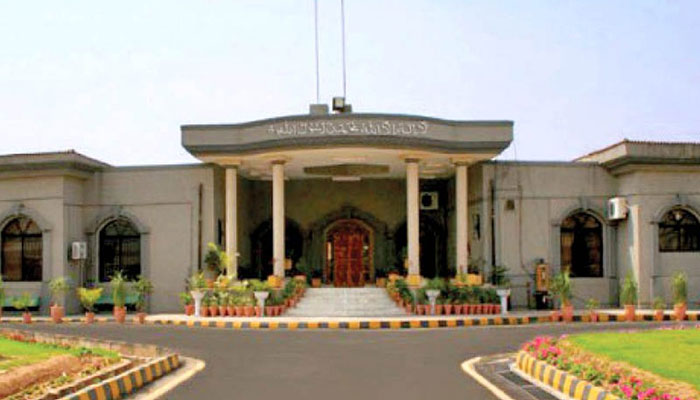IHC CJ writes to lawyers bodies to take action over Feb 8 incident
ISLAMABAD: Islamabad High Court (IHC) Chief Justice Athar Minallah On Thursday wrote a letter to the vice chairmen of Pakistan Bar Council (PBC) and Islamabad Bar Council (IBC) calling for stern action by the regulatory bodies against the lawyers that vandalised the IHC building on Monday last (February 8).
Copies of the letter were also sent to President, Supreme Court Bar Association, Members of PBC, IBC, Islamabad High Court Bar Association (IHCBA) and Islamabad District Bar Association (IDBA), and bar rooms of IHC and IDB.
Under the title of “Images of the vandalized chambers of the Chief Justice, Islamabad High Court” 16 pictures were attached at the end of the letter showing damaged LCDs, plant pots, window pans, blinds, furniture, ACs and doors.
The IHC chief justice drew the attention of the lawyers’ regulatory bodies towards the grave misconduct of a handful of enrolled advocates who stormed the IHC and threatened the Hon’ble judges, while in uniform of the “most noble professions that ensures fundamental rights of the people”.
“I could not have even remotely suspected that enrolled advocates dressed in uniform would take law into their hands, let alone resorting to violence, vandalism and obstruction to justice,” he said.
The IHC judge went on to remind that “They were the same lawyers who had marched across the country during the historic lawyers’ movement to establish rule of law and restore the Constitution.”
The IHC Chief Justice, who was conducting judicial proceedings on the fateful day, received a note from the IHC Registrar that around 100-150 lawyers had left the District Courts in F-8 and are currently on their way towards the High Court.
He was told that the lawyers were agitated and enraged because of the demolition of their chambers by the Capital Development Authority. Justice Athar Minallah said that by any stretch of his imagination he didn’t apprehend a likely law and order situation and the “shocking display of travesty of dignity of one of the noblest professions.
“The enraged mob, all dressed in uniform, rushed towards me raising slogans and shouting at the top of their voices,” he detailed. But even then, the Hon’ble judge didn’t seek protection of the police officials, including the Senior Superintendent of Islamabad Police (SSP) as he felt that seeking protection of police officials from being harmed by the acts of enrolled advocates was an affront to the office he holds. Narrating his plight, he said he was forced by the unruly violent mob to go to the Bar room, upon which he resisted.
The Hon’ble judges of the Islamabad High Court were confined to their chambers for many hours and the judicial proceedings couldn’t be carried out on the day.
While mentioning the action being planned by the LEAs to clear the constitutional court of the miscreant lawyers and clear the passage for the Hon’ble judges safe exit.
He said: “I refused (the police operation) because it could have reduced a constitutional court to a battleground and undermined the prestige and sanctity of a hallowed institution where justice was dispensed to all and sundry.”
Chief Justice Athar Minallah, while drawing a comparison with the storming of the Supreme Court in 1997, said that the February 8 incident was even “more grave in nature.” The Supreme Court of Pakistan was stormed by unruly lawmakers belonging to the Parliament who belonged to the Pakistan Muslim League-Nawaz.
While regretting the incident, the IHC Judge said, “This incident involved enrolled advocates, the guardians of the rule of law and upholders of the dignity of the noble profession of law” and that “They were involved in desecrating their own alma mater by displaying shockingly violent and intolerable behavior and misconduct.”
The IHC chief justice expressed faith in the ability of the legal regulatory framework, which includes Pakistan Bar Council and Islamabad Bar Council “to uphold the dignity of the profession and restore the confidence of the real stakeholders i.e., the people of Pakistan, in the judicial branch of the State.”
He made it quite clear to the regulatory bodies that no way could the miscreant lawyers who had brought disrepute to the entire fraternity could escape accountability.
While reminding the moral and ethical duty of the legal profession, the judge said, “It is the duty of every enrolled advocate to become a role model for others in the society.” He however expected the Bar Councils to follow such standards of accountability that would become a lesson for all legal professionals – that what will be the consequences if they ever breached the code of conduct.
“The dignity and sanctity of the elevated legal profession depends on the enforcement of the regulatory framework by the Pakistan Bar Council and Islamabad Bar Council, as the case may be,” he said.
Concluding the letter, IHC Chief Justice Athar Minallah said, “I am hopeful that the Pakistan Bar Council or the Islamabad Bar Council, as the case may be, will discharge their obligations as conscientious regulators by promptly and demonstrably showing resolve to hold every enrolled advocate accountable who was involved or had aided or facilitated the storming of the Islamabad High Court and/or committed or aided or felicitated the commission of the aforementioned acts thus bringing disrepute and shaking public faith in members of the legal fraternity being foremost guardians of rule of law in the society.”
-
 Canada And China Trade Deal: All You Need To Know About The New Agreement
Canada And China Trade Deal: All You Need To Know About The New Agreement -
 Tyler Hilton, Megan Park Call It Quits After 10 Years Of Marriage
Tyler Hilton, Megan Park Call It Quits After 10 Years Of Marriage -
 Prince Harry’s Fears Turn Concerning As Archie, Lilibet Slip Too Far Out Of Reach: ‘Their Too American’
Prince Harry’s Fears Turn Concerning As Archie, Lilibet Slip Too Far Out Of Reach: ‘Their Too American’ -
 Former Nickelodeon Star Kianna Underwood Dies At 33 In Tragic Hit-and-run
Former Nickelodeon Star Kianna Underwood Dies At 33 In Tragic Hit-and-run -
 Prince Harry Risks Straining Marriage To Make Archie, Lilibet Make Emotional Demand Of Meghan
Prince Harry Risks Straining Marriage To Make Archie, Lilibet Make Emotional Demand Of Meghan -
 Sarah Ferguson’s Pal Reveals What She Really Thinks Of Beatrice, Eugenie Choosing A Royal Christmas
Sarah Ferguson’s Pal Reveals What She Really Thinks Of Beatrice, Eugenie Choosing A Royal Christmas -
 North West Raps About Piercings, Tattoos And Skipping School In New Song
North West Raps About Piercings, Tattoos And Skipping School In New Song -
 Teddi Mellencamp Shares Hopeful Health Update Amid Cancer Battle: 'Cloud Is Lifting'
Teddi Mellencamp Shares Hopeful Health Update Amid Cancer Battle: 'Cloud Is Lifting' -
 Prince William Makes Clear The Conditions He Has For Meeting Prince Harry
Prince William Makes Clear The Conditions He Has For Meeting Prince Harry -
 Sara Foster Slams Age Gap Relationship After 'blah' George Clooney Date
Sara Foster Slams Age Gap Relationship After 'blah' George Clooney Date -
 Jennifer Garner Recalls Enduring Ben Affleck’s Intense Beyoncé ‘Halo’ Phase
Jennifer Garner Recalls Enduring Ben Affleck’s Intense Beyoncé ‘Halo’ Phase -
 Prince Harry’s Mental Health Ends Up At Stake As Meghan Moves Him To 'second Fiddle'
Prince Harry’s Mental Health Ends Up At Stake As Meghan Moves Him To 'second Fiddle' -
 Bradley Cooper On Who His Mother Thinks Is The World’s Best Actor
Bradley Cooper On Who His Mother Thinks Is The World’s Best Actor -
 Meghan Markle Offers Glimpse Into Intimate Dance Moment With Harry Amid Split Rumors
Meghan Markle Offers Glimpse Into Intimate Dance Moment With Harry Amid Split Rumors -
 Jon Bon Jovi Joins The Viral 2016 Throwback Trend With Nostalgic Photos
Jon Bon Jovi Joins The Viral 2016 Throwback Trend With Nostalgic Photos -
 Kate Middleton Hailed For Her Lack Of ‘obligation’ As Well As Altruistic, Selfless Qualities
Kate Middleton Hailed For Her Lack Of ‘obligation’ As Well As Altruistic, Selfless Qualities




